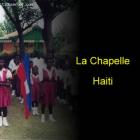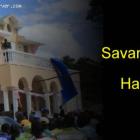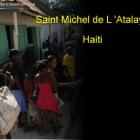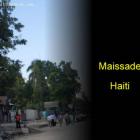ADVERTISEMENT
Entertainment
The principal entertainment that we will address in this section are Movies and comedies. There are many talent Haitian individuals performing in there areas. Some of them have reached the international level
Haitian Singer Herold Christophe passed away
Many who grew up with many of the love songs of singer Herold Christophe are sad today. The popular Haitian singer died on August 28 after a long illness.
Herold Christophe, the great love singer of the Haitian girls in the late 80s, has left for another world on August 28, 2015. He has died in Boston, Massachusetts, after his five year long fight with prostate cancer. As per news sources, for the last five years, the singer had tried everything; gone through many sessions of chemotherapy, radiation, surgery, blood transfusion, and he even followed many forms of natural remedies. Unfortunately, earlier this year, the doctors told his family members that the last sessions of chemotherapies were doing more harm than good to him. In the span of last 2-3 months, he had lost his ability to eat, drink, swallow or move and was even fighting to breathe.
Haiti to Host the 12th Edition of CARIFESTA
The Haitian people are preparing themselves for the upcoming CARIFESTA XII festival in the month of August. They will greet and host several thousands of people from the region and other guests from the CARICOM member states. The festival of arts and culture will run from August 14 to 23 and will feature events across the country. Haiti had been officially named as the host country for the 12th edition of the CARIFESTA regional cultural festival in April 2013.
The CARIFESTA or Caribbean Festival of Arts, has assumed a pre-eminent place because it is not just about shows and exhibitions. It's meant to provide a forum where artists can discuss motivation, technique and other aspects of the arts. It is an international, multicultural event organized on a periodic basis by the countries of the Caribbean. The main purpose of the festival is to gather musicians, artists, authors, and to display the folkloric and artistic expression of the Caribbean and Latin American region. This year's theme would be `Our Roots, Our Culture, Our Common Future'.
Michel Tassy of the Orchestre Septentrional is dead
We just learned the death of a great musician. Former lead vocalist Michel Tassy of the Orchestre Septentrional has passed away. He was the oldest active member of the band.
Michel Tassy started with Septentrional in 1963 when the band was just 15 years old. he has remained with them until his death. He was also the vice president of Septentrional organization, a group that has been involved and contributing in many aspects of the society.
He will join some of the great names in the band and the history of Haitian music such as Roger Colas and Ulrick Pierre-Louis just to name a few.
The 12th Arts Festival Of The Caribbean, Carifesta to Be Held In Haiti
Recently, on the third week of March 2015, Jean Michel Lapin, the Director General of the Haitian Ministry of Culture, accompanied by Elsa Baussan Noel, the Adviser to the President Martelly and other officials, Robert Denis of Council of Performing Arts, Geneviève Louissaint Boncy of the particular office of Head of State, have made an assessment on the needed renovation works for several public places where various activities of the upcoming 12th Arts Festival of the Caribbean, "Carifestato", would be held between August 14th and 23rd. The theme of this festival would be "Our Roots, Our Culture, Our Common Future".
The Haitian Prime Minister, in the presence of the Minister of Culture and Minister of Tourism and Creative Industries, has launched an official website for the festival named "CARIFESTA" (www.carifesta.net/) which will provide information related to all cultural events of the program. During this occasion, the Prime Minister has said that this gives an opportunity to exhibit our tourism potentials and richness of our cultural diversity and at the same time it also shows our ability to organize such a major cultural festival. He has invited all cultural sections of the country to represent and bring forth their talents to make this event a success. Stéphanie Balmir Villedrouin, the Minister of Tourism and Creative Industries has guaranteed that the entire tourism sector is ready to welcome and accommodate some 2,000 delegates, representing participating countries in the major event. Dithny Joan Raton, the Minister of Culture has said that this is an opportunity to highlight country's tourism potential. He has also announced a range of colorful activities to make the festival attractive with many memorable moments.
The Creation Youth Orchestra In Cite Soleil, Haiti
Pastor Jean Enock founded the "Occide Jeanty Music Academy" in Cité Soleil in 2006. Cité Soleil is an extremely impoverished and densely populated commune located in the Port-au-Prince metropolitan area with an estimated 200,000 people. It was the place where the pastor was born, grew up and spent most part of his life to set up a "Haitian Youth Orchestra" -- the dream of his life. He started with nothing to open up an "alternative paths" to steer away local youths from gangs and violence. His dream took ten years to take shape. Most of the residents of Cite Soleil are unemployed. A majority of Cite Soleil residents are children. 'Youth Orchestra In Cite Soleil' now functions in three locations, give lessons to over 250 students on wind, string, and percussion instruments and they perform in a chamber orchestra, a symphonic band. The students come from extremely impoverished backgrounds; contribute a nominal fee to participate in the program under a small team of part time teachers.
Raoul Peck's Fatal Assistance Compared to Nazi Tactics by Sean Penn
Raoul Peck (born 1953, Port-au-Prince, Haiti) is a Haitian award winneing filmmaker who fled the Duvalier dictatorship with his two younger brothers and joined his father in Kinshasa, Democratic Republic of the Congo when he was only 8 years old. Before studying industrial engineering and economics at Berlin's Humboldt University, he attended schools in the DRC (Kinshasa), in the United States (Brooklyn). He earned a baccalaureate in France (Orléans). His recent film 'Fatal Assistance' (Assistance Mortelle) released last year, highlights the colossal aid failure in Haiti's reconstruction. This documentary tries to find out how, in spite of many international community's promises, the needs of ten million Haitians ended in a paltry fashion.
Stones in the Sun, a film written and directed by Patricia Benoit
Writer and director Patricia Benoit has released "Stones in the Sun", chosen by the New York Times as a Critics' Pick. Set in the late 1980s in New York the film traces the stories of several Haitian exiles that have fled Haiti after Jean-Claude Duvalier's rule, continued in his absence through his military power structure.
The film asks questions like: how does one start or continue a life? Is it better to sever ties with the past or remain loyal to your roots?
Micheline has chosen to Europeanize herself as a Frenchwoman in the U.S. after her husband is killed in Haiti. She lives a comfortable lifestyle as a Realtor, but when elder daughter Yannick shows up it's a what-will-the-neighbors-think conflict between the two, for Yannick is a political activist and teacher, loyal to her Haitian heritage.
New Orleans Mardi Gras better than Haiti Carnival
The first official Mardi Gras parade was held in New Orleans on Feb. 24, 1857 by the Krewe of Comus. However, it started on the streets of New Orleans much earlier from the late 1830's with street processions of maskers with carriages and horseback riders to celebrate Mardi Gras. Since then over 1,800 Mardi Gras parades have been staged in metro New Orleans and the festivities have grown into one of the world's grandest tourist attractions. The season of merriment begins in New Orleans each year on January 6. The traditional colors of the New Orleans Mardi Gras are purple, green, and gold with their meanings justice, faith and power respectively. It is illegal to ride on a Mardi Gras parade float in New Orleans without wearing a mask.
Haiti Mardi Gras facts
"Mardi Gras" or "Fat Tuesday" (in French), has its origins in medieval Europe that dates back thousands of years to pagan celebrations of spring and fertility, including the raucous Roman festivals of Saturnalia and Lupercalia.
The festival marks the last day before Catholics begin Lent on Ash Wednesday. It is a holiday which is celebrated around the world by people of various beliefs because it focuses on having a good time and enjoying food and drink. It has many international names, such as Martes de Carnaval in Mexico, Martedi Grasso in Italy, Fastan in Sweden, J'Ouvert in Trinidad, and Karneval in Germany. The Mardi Gras has five popular traditions. Here their meanings are explained. (1) Wearing masks (it hides class constraints); (2) The Flambeaux Tradition (in the beginning shredded rope soaked in pitch were carried by the slaves so that the nighttime revelers could enjoy festivities); (3) Throwing Of Beads (color chosen by the king was thrown to the person who exhibited the meaning of the color like justice, power or faith); (4) Rex, The King of Carnival (a prominent person is chosen) and (5) Handing Out Zulu Coconuts (a favorite Mardi Gras throw, considered priceless).
Carnival History, Kanaval
Hundreds and hundreds of years ago, the Catholics in Italy started the tradition of holding a wild costume festival right before the first day of Lent. In the olden days, Catholics were not supposed to eat meat during Lent and they called their festival, "carnevale" -- which means "to put away the meat." Gradually this practice became popular and the practice spread to France, Spain, and all the Catholic countries in Europe. With the European colonial powers or where the European Catholics entered into the slave trade, the carnival took root and thus the practice came to the Americas and other parts of the world. Important to Caribbean and Haitian festivals are the practice of African traditions where people parade and move in circles through villages in costumes and masks, because they believe circling the village bring good fortune, heal problems, chill out angry relatives who had died and passed into the next world. They use the feathers on masks and headdresses as a symbol of ability to overcome problems, illness, pains, heartbreaks, to grow spiritually and reborn to a new better life. Their drums and music traditions have also transformed the early carnival celebrations in the Americas.
Our objective is to share with you news and information about Haiti and the people of Haiti. Traditions, habits and the way we were or grew are alive in this site. We highly recommend that you Subscribe to our Newsletter and also share with us some of the things that are memorable and made us unique people.

 La Chapelle, Haiti
La Chapelle, Haiti  The Town of Savanette, Haiti
The Town of Savanette, Haiti  Saint Michel de L 'Atalaye
Saint Michel de L 'Atalaye  Haitian Creole Translation
Haitian Creole Translation  Maissade, Haiti
Maissade, Haiti